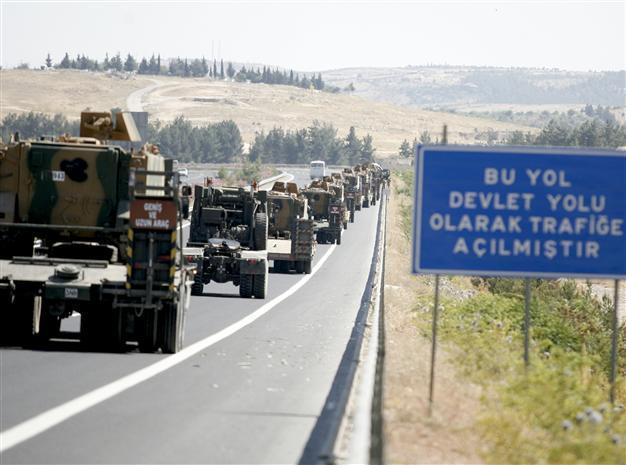Ankara concerned about new refugee influx after ISIL gains
Barçın YİNANÇ - ISTANBUL

AA photo
The latest military advances of the Islamic State of Iraq and the Levant (ISIL) near the Turkish border could trigger a new influx of refugees, which Turkey would be unable to handle, a high-level official said July 2.In addition to the refugee influx, the probability of a ferocious terrorist organization taking control of a region right across a key border crossing has also intensified plans to provide military support to the Free Syrian Army in the fighting against ISIL. In addition to intensified talks with Washington for joint action, the government is continuing to work on a road map that includes phased measures designed to prevent further ISIL advances.
While the Democratic Union Party (PYD) of Syrian Kurds could also emerge as a rational player, Turkey remains doubtful about its reliability due to concerns that its actions could trigger further ethnic tension between Arabs and Kurds. “We would be extremely concerned if the PYD was tempted exploit its ability to fight ISIL by committing ethnic cleansing, which carries the potential of long-term ethnic contention,” said the official.
The latest alarming developments on Turkey’s borders took a critical turn in the last week of March, which saw the fall of Idlib from the regime’s control. In a meeting between regime officials and ISIL, the latter was told that the area north of Aleppo would be left into its control. Supported with aerial bombing by Bashar al–Assad’s air force, ISIL was able to advance and approach Turkey’s border from Karkamis (Jarablus) to Öncüpınar (closer to Azez), one of the nine crossing points that has started ring alarm bells.
As the Free Syrian Army does not look strong enough to keep its hold on the region, which covers a population of nearly 3.5 million people, Turkey’s concerns about a new wave of refugees have peaked. Already host to 2 million refugees, Turkish officials said they would be unable to handle such a new huge influx.
While U.S. military strikes seem to have stopped ISIL’s advances, Turkey remains vigilant and working on possible scenarios to support “friendly forces” fighting ISIL. Within that framework, talks have intensified with the U.S. government over joint action, despite the fact that differences remain over the conditions of cooperation. In past talks, the U.S. asked to use the İncirlik military base in Turkey to strike ISIL targets, while Ankara conditioned use of the airbase on the establishment of a no-fly zone and a secure zone on the border.
Meanwhile, in contrast to pro-government media claims that the PYD is more dangerous than ISIL, the PYD is seen by the official I spoke to as a rational actor, despite uneasiness over its links to the outlawed Kurdistan Workers’ Party (PKK).
“Turkey’s relations with the PYD depend on their attitude,” said the Turkish official, adding that the PYD’s actions in Tel Abyad will be a “test case.” ISIL military losses are in the interests of Turkey, but this should not come at the expense of ethnic cleansing conducted by the PYD, which would fuel Kurdish–Arab ethnic tension and be detrimental for Syria, the official added.
The Bashar al–Assad regime, trapped within just 20 percent of Syria, is suffering from war fatigue, according to the Turkish official, who said some countries in the region have now started talking about the collapse of the regime.
















